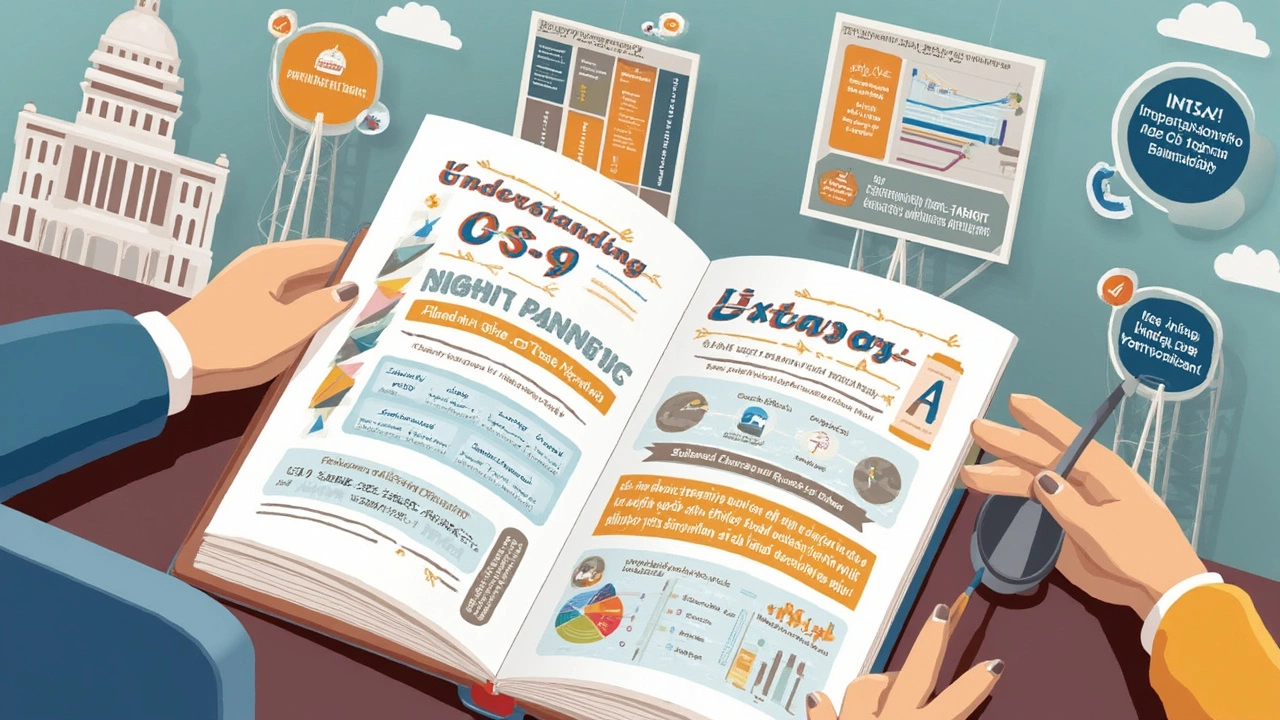GS 9 level experience trips up a lot of folks aiming for federal jobs. These words pop up all over USAJOBS—sometimes they even decide if you get an interview or your resume gets tossed out by the applicant tracker. So, what does it actually mean?
If you see “GS 9 level experience” in a job ad, the agency isn’t just checking for any old work. They're after experience that’s close to what a first-year master’s degree holder or someone with a couple years of higher-level professional work would handle. Think: real decision making, responsibility for projects, and solving trickier problems, not just following instructions.
One thing to keep in mind—‘GS’ stands for ‘General Schedule,’ and the 9 is the grade. It’s kind of like a ranking. Each step up means more pay and more complex duties. Not sure if you qualify? Don’t panic. Tons of people land GS-9 jobs without direct government work. What matters is how you show your experience lines up with the job’s tasks.
- Understanding GS 9 Level Basics
- What Counts as GS 9 Experience?
- Translating Your Experience for Applications
- Tips for Gaining GS 9 Qualifications
- Mistakes to Avoid in Your GS 9 Application
Understanding GS 9 Level Basics
If you've been searching for federal work, you've probably seen "GS 9 experience" pop up all over USAJOBS and in government job descriptions. GS stands for General Schedule—that’s the main pay scale for most white-collar jobs in the federal government. The 9 in GS 9 experience isn’t random—it’s actually a grade level in the system, and it matters a lot when it comes to pay, perks, and the kind of work you’ll be doing.
At GS-9, you're looking at jobs that sit almost smack in the middle of the General Schedule (which runs from GS-1 to GS-15). For context, GS-9 pay in 2024 starts around $55,000 in the DC area and goes up based on location and step increases.
So, what kind of work does GS-9 cover? It's not entry-level, but it’s not quite senior management either. You’ll probably be handling assignments with some independence, doing analysis, writing reports, or making decisions instead of waiting for instructions. For a lot of roles, it matches up with what someone would do after finishing a master’s degree or grabbing a couple years of experience after a bachelor’s.
A hiring manager once summed it up perfectly:
"At GS-9, we expect you to hit the ground running—bring your own ideas, figure out how to solve problems, and show you can handle more than just the basics." – HR Supervisor, U.S. Department of Labor
Here’s what to remember about the GS 9 level basics:
- GS-9 usually fits jobs for people early in their careers but who already have some professional chops.
- You need to show either a master’s degree in a relevant field OR at least one year of specialized experience that matches the job’s duties.
- Specialized experience means stuff like handling projects, analyzing data, writing detailed reports, or making recommendations—not just following someone else’s instructions.
- Location matters: GS-9 pay varies based on where you work in the U.S. The law requires certain "locality adjustments." If you’re curious, check the Office of Personnel Management (OPM) website—they list all the pay tables.
| Grade | Typical Education/Experience Needed | 2024 Starting Pay* |
|---|---|---|
| GS-7 | Bachelor’s + some experience | $44,500 |
| GS-9 | Master’s or 1 year at GS-7 level | $55,000 |
| GS-11 | PhD or 1 year at GS-9 level | $66,000 |
*Approximate salary, DC area, not including locality pay
When you see "GS 9 experience" as a requirement, they want to know if you really have the background to take on this kind of work. That’s what makes it so different from applying for private sector jobs with fuzzy requirements—here, you have to hit the government’s standards pretty much dead-on.
What Counts as GS 9 Experience?
If you want to hit the GS 9 experience mark, you need to show more than general skills or just any office work. The federal hiring system is picky: your past jobs must prove you handled tasks at a certain level. At GS-9, that means work that’s kind of like what you’d do with a master’s degree, or about a year of experience beyond the GS-7 level—think analysis, project leadership, or specialized technical skills.
It’s not enough to say you "worked on projects." Instead, you should show how you planned parts of those projects, took the lead on specific deliverables, or had responsibility for making decisions. The hiring folks look for things like:
- Writing original reports, policies, or research with minimal supervision
- Managing or leading teams (even small ones, or on short-term projects)
- Solving non-routine problems using judgment and technical knowledge
- Creating or improving processes, not just following them
- Training others in key skills or procedures
If you’re coming in from outside the federal system, the job post will often mention “52 weeks of specialized experience at the GS-7 level.” That means you should be able to point to a full year where you were trusted to handle harder, less-scripted work. For example: maybe you ran a pilot program at a nonprofit, juggled several client accounts at once, or built new tools at your tech job. Did you have to think on your feet and fix bigger issues? That totally counts.
| Example Role | GS 9 Equivalent Duty |
|---|---|
| Junior Data Analyst | Designing new analysis methods, training others |
| Small Team Supervisor | Leading project work, writing reports for execs |
| Policy Assistant with 2 years’ experience | Independently drafting policy memos, advising staff |
Another way to qualify is through education. If you have a master's degree or completed two full years of higher-level graduate study (in the field they want), that alone can get your foot in the door for GS 9 level experience jobs. Sometimes you can even combine education and experience to meet the bar, so don’t skip details—spell out your wins on your resume.

Translating Your Experience for Applications
This step is where most people get tripped up. Just doing GS 9 experience level work isn’t enough if you can’t show it clearly to hiring managers. USAJOBS and most agencies look for specific keywords and examples. The trick? Don’t just say “managed projects” or “solved problems.” Spell out what you did and how it matches the grade 9 job description.
Here’s what federal HR wants to see:
- Quantify your work: “Tracked and managed budgets up to $200,000,” or “led a team of 6 to deliver outreach programs.” Numbers make your experience jump off the page and scream ‘GS 9 level.’
- Mirror their language: If the job listing says “analyze data, prepare reports, coordinate tasks”—work those same words into your resume where it’s true.
- Show autonomy: At GS 9, you’re expected to handle work with little supervision. Tell how you made decisions, solved issues, or explained ideas to others.
- Spotlight results: Did something you handled make the process smoother, save money, or help someone meet a deadline? Spell out the outcome.
For example:
- Instead of “helped with reports,” say “researched and wrote biweekly trend analysis reports used by department leaders to plan projects.”
- Swap “worked on team projects” for “led team meetings, tracked deliverables, and delegated tasks to keep a 4-person project on schedule.”
Don’t forget to match your experience to the GS 9 qualification standards published by the Office of Personnel Management (OPM). These typically include one year of specialized experience equivalent to the GS 7 level—meaning you did work that required you to make decisions, analyze complex info, and handle some leadership or independent responsibility.
Want a stat that might surprise you? According to 2023 OPM data, over 40% of applicants get screened out just because their experience isn’t spelled out clearly enough. If you do nothing else, at least double-check your resume for key tasks and results that line up with the exact vacancy announcement.
Here’s a cheat sheet table to match your main responsibilities with GS 9 requirements:
| Task Area | How to Phrase for GS 9 |
|---|---|
| Project Management | "Managed timelines, budgets, and staff assignments for multi-phase projects." |
| Reporting | "Gathered and analyzed data, prepared technical reports for senior staff." |
| Problem Solving | "Identified workflow gaps, proposed new solutions that cut delays by 15%." |
| Leadership | "Trained and supervised 3 junior employees, reviewed their work for quality." |
So, the more specific you get, the better. Fill your application with concrete facts and results, and you’ll have a real shot at landing that GS 9 experience role.
Tips for Gaining GS 9 Qualifications
Aiming for that GS 9 experience isn’t just about waiting for a few extra years on the job. It’s about knowing exactly what counts and building up the right mix of skills, schooling, and projects.
- Stack up your education: A master’s degree at least makes you automatically eligible for GS 9 federal jobs in many fields, even if you just finished school. If you’re still working on your degree, check if you qualify for programs like the Recent Graduates path on USAJOBS.
- Take charge of bigger stuff at work: Don’t just fill in spreadsheets or follow directions. Volunteer for projects where you solve problems, lead a small team, or manage a program. Agencies want real responsibility, not just time served.
- Keep records of your wins: Jot down every time you improved a process, made decisions, or handled things “above your pay grade.” When filling out applications, you’ll need to prove you worked at a GS 9 level. Stash examples in a folder; you’ll thank yourself later.
- Grab certifications and trainings: Stuff like Project Management Professional (PMP), Six Sigma, or tech certs show you’re serious about your growth. Sometimes these can nudge your application past others who have similar work histories.
- Look for details, temp assignments, or acting roles: In government, there are ways to step into "higher-graded" shoes temporarily. Other agencies call them details, temp promotions, or acting gigs. Two or three months running a team or working on policy can count as GS 9 level experience.
One real trend: A 2023 survey by the Partnership for Public Service found that about 54% of new federal hires at the GS 9 level used a mix of graduate school and private sector experience to land their jobs. Agencies aren’t looking just at government work, so don’t undersell “civilian” jobs or projects.
| Common Ways to Meet GS 9 Qualifications | Details |
|---|---|
| Master’s Degree | Qualifies you directly in many disciplines |
| One year of GS-7 level experience | Must be clearly described on your resume |
| Specialized Certifications | PMP, tech certs, industry credentials |
| Temporary higher-level assignments | Details, temp duty, or acting roles |
The trick is matching your background to what the job actually asks for. Swap the buzzwords in your application for language used in the vacancy announcement. If it asks for “independent research” or “project oversight,” pick out those stories from your own experience—this isn’t the time for modesty.

Mistakes to Avoid in Your GS 9 Application
Lots of qualified people miss out on GS 9 experience jobs just because of avoidable slip-ups during the application. Here’s what trips people up the most—and how you can sidestep these traps.
- Being too vague about your duties: Hiring managers want facts. Don’t just say you “assisted with projects”—name the actual projects, your specific part, and any results. Show you worked at a level similar to the job posting.
- Leaving out jobs that count: Some folks don’t list work from outside the federal sector, not realizing private-sector jobs or volunteer gigs can absolutely fit if they match GS 9 responsibilities.
- Making your resume too short: Government resumes aren’t like regular resumes. The sweet spot is usually 3–5 pages. You need to tell your full story—details, metrics, and all.
- Skipping the questionnaire: Every USAJOBS listing comes with a questionnaire. Your answers need to line up with the experience in your resume. If they don’t match, even spot-on experience gets tossed out by the system.
- Forgetting keywords: Don’t copy and paste the job title, but make sure your resume repeats key phrases from the posting, like GS 9 experience or the exact skills they mention.
Here’s a look at the top federal resume mistakes by percentage, based on 2023 Office of Personnel Management data:
| Mistake | Applicants Affected (%) |
|---|---|
| Not detailing duties | 37 |
| Missing keywords | 29 |
| Job mismatch on questionnaire | 24 |
| Skipping non-federal experience | 18 |
One more thing—don’t try to stretch your experience. If you exaggerate, HR specialists will see right through it. Just connect the dots between your work and GS 9 level tasks. If you’re not sure, read the job ad again and ask yourself: where have I solved problems, managed some kind of project, or trained others? That’s what matters.
Double-check every part of your application before you click submit. A missed detail is sometimes the only thing standing between you and that government job.
